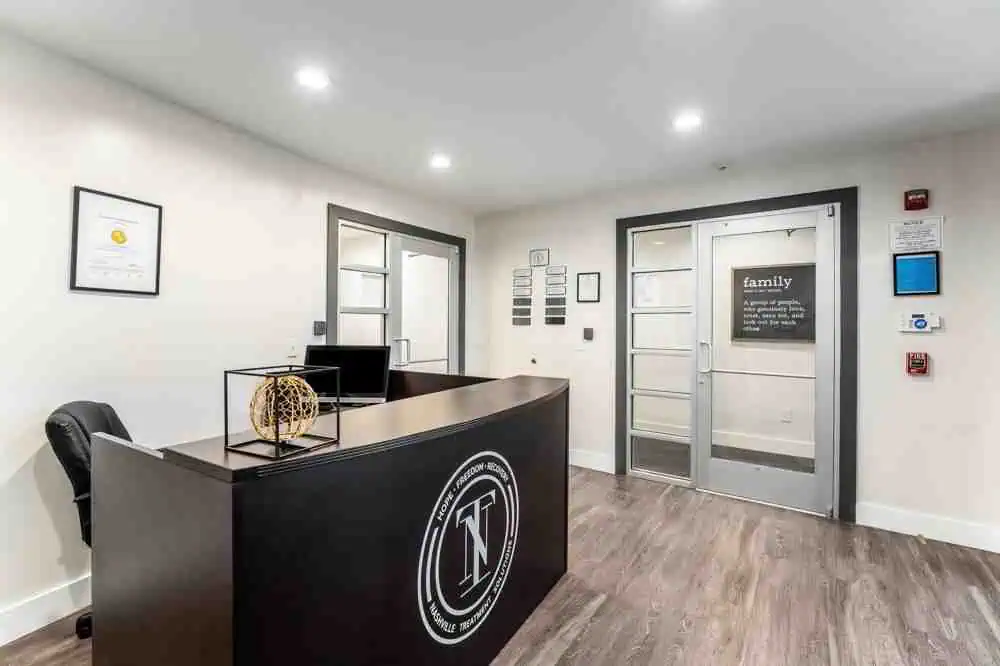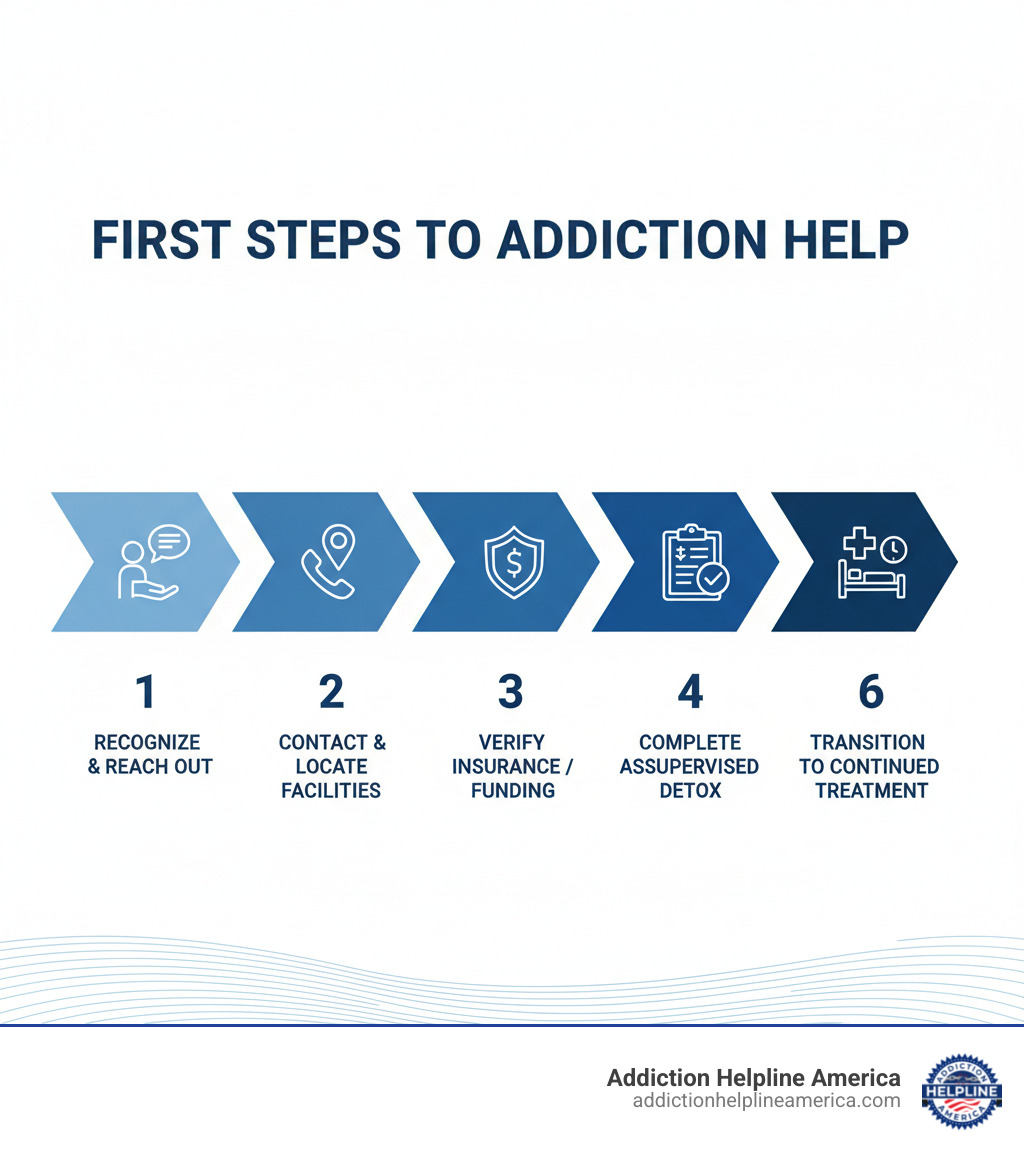
Your Guide to Finding the Right Detox Facility
A detox facility near me is a medically supervised treatment center where you can safely withdraw from drugs or alcohol with 24/7 professional support. Here’s what you need to know right now:
Quick Guide to Finding a Detox Facility:
- Medical Detox Centers – Inpatient facilities with 24/7 nursing care for severe withdrawal
- Outpatient Detox – Day programs for less severe addictions with strong home support
- Same-Day Emergency Detox – Immediate admission for dangerous withdrawal situations
- State-Funded Programs – Low or no-cost options for those without insurance
- Private Facilities – More amenities and specialized programs with insurance or self-pay
Typical Timeline: Most detox programs last 3-7 days, but can extend to 2-3 weeks depending on the substance and severity.
Payment Options: Most insurance plans cover detox services, including Medicare and Medicaid. State-funded programs are available for those without coverage.
Taking the first step toward recovery takes courage. If you or someone you love is struggling with addiction, you’re not alone. In 2022, of the 54.6 million Americans who needed substance use treatment, only 13.1 million received it. This gap often exists not because people don’t want help, but because they don’t know where to find it or feel overwhelmed by the options.
Withdrawal from substances like alcohol and benzodiazepines can be dangerous—even life-threatening—without proper medical supervision. That’s why finding the right detox facility near me matters so much. A quality detox center provides the medical care, emotional support, and safe environment you need to begin healing.
This guide will help you understand what detox involves, how to identify a quality facility, what questions to ask, and how to pay for treatment. We’ll walk you through the entire process so you can make an informed decision when you’re ready to take that crucial first step.
At Addiction Helpline America, we’ve spent years connecting individuals and families with effective treatment options for substance use disorders, including helping them find the right detox facility near me. Our mission is to provide compassionate, confidential support and guidance to anyone seeking recovery, regardless of where they are on their journey.
Call Now – Your Journey to Recovery Begins Today!

Take the first step towards a healthier life! Call now to connect with our compassionate team and start your recovery journey today. Your path to healing awaits!
Our recovery specialists are available 24/7 to provide support, and all calls are confidential and free. Reach out anytime – we’re here to help!

Understanding Detox: Your Crucial First Step to a New Life
Let’s talk about what detox really means and why it matters so much for your recovery journey.
A detox facility near me is a specialized medical center where you can safely withdraw from drugs or alcohol under professional care. Think of it as a safe harbor during the storm of withdrawal—a place where medical experts help your body adjust to functioning without the substance it’s become dependent on.
The goal isn’t just to “get clean.” It’s to do so safely, with as much comfort as possible, while preparing you for the longer road to recovery ahead.
Medically Supervised Withdrawal: Your Safest Bet
Here’s the honest truth: detoxing at home might seem easier or more private, but it can be incredibly dangerous.
When your body has adapted to regular substance use, it doesn’t just “reset” when you stop. Withdrawal happens because your brain and body are struggling to find balance again. For some substances—especially alcohol and benzodiazepines—this process can trigger seizures, dangerous changes in heart rate and blood pressure, or even a condition called delirium tremens (DTs) that can be fatal without medical intervention.
Even substances with less dangerous withdrawal symptoms, like opioids, can cause such intense physical and emotional discomfort that relapse becomes almost inevitable without support.
This is where medically supervised detox makes all the difference. At a quality detox facility near me, you’re never alone during this challenging time.
You receive 24/7 medical monitoring from trained doctors and nurses who watch your vital signs, assess your symptoms, and respond immediately if complications arise. They know exactly what warning signs to look for and how to keep you safe.
Medication management is another crucial benefit. Specific medications can ease withdrawal symptoms, reduce cravings, and prevent dangerous complications. Medical professionals administer these carefully, adjusting dosages based on how your body responds. This isn’t about trading one substance for another—it’s about using proven medications to help your body heal safely.
The environment itself provides protection. You’re in a drug-free, structured space away from the people, places, and situations that might trigger cravings. You don’t have to worry about access to substances or making it through another day on willpower alone. You can focus entirely on physical healing.
Comprehensive assessment and planning happen alongside the detox process. The medical team evaluates your physical health, mental health, substance use history, and personal circumstances. This information shapes your personalized treatment plan and helps ensure a smooth transition to the next phase of recovery.
Withdrawal symptoms vary depending on what substance you’ve been using, how much, and for how long. Physical symptoms might include nausea, vomiting, muscle aches, tremors, sweating, headaches, and extreme fatigue. Some people experience seizures. Psychological symptoms can be just as challenging—anxiety, depression, irritability, trouble sleeping, and intense cravings are common.
These symptoms aren’t just uncomfortable. They can be overwhelming and, in some cases, life-threatening. Professional medical intervention isn’t a luxury—it’s essential for your safety and your best chance at successful recovery.
At Addiction Helpline America, we’ve seen how medically supervised detox provides the foundation for lasting recovery. We connect you with facilities that understand the complexities of withdrawal and prioritize your safety and comfort throughout the process.
Detox addresses the physical dependence, but it’s just the beginning. To learn more about how detox fits into comprehensive addiction treatment, visit our page on the role of detox in rehab.
Call Now – Your Journey to Recovery Begins Today!

Take the first step towards a healthier life! Call now to connect with our compassionate team and start your recovery journey today. Your path to healing awaits!
Our recovery specialists are available 24/7 to provide support, and all calls are confidential and free. Reach out anytime – we’re here to help!
Choosing Your Path: Types of Detox Programs and Timelines
Not all detox facility near me programs are the same, and that’s actually a good thing. Different people need different levels of care, depending on what substance they’re coming off, how long they’ve been using, and what kind of support they have at home. Understanding your options helps you choose the path that gives you the best chance at a safe, successful detox.

Different Detox Program Options
The main difference between detox programs comes down to where you stay and how much medical supervision you receive during withdrawal.
Inpatient detox and residential programs mean you live at the facility full-time while you detox. You’ll have medical staff watching over you 24 hours a day, seven days a week. This is the safest option if you’re dealing with severe addiction, especially to alcohol or benzodiazepines where withdrawal can be dangerous. It’s also recommended if you’ve had complicated withdrawals before, if you have mental health conditions alongside your addiction, or if your home environment isn’t stable or drug-free. Being in a structured, supportive place where you can focus entirely on healing makes a huge difference.
Outpatient detox programs let you live at home while attending treatment during the day. This can work well for people with less severe dependence who have a strong support system and a safe, substance-free place to go home to each night. You’ll still have medical supervision, just not around the clock. Some outpatient programs include Partial Hospitalization Programs (PHP), where you spend most of your day at the facility, or Intensive Outpatient Programs (IOP), which require fewer hours per week. These options require discipline and a stable home life, but they allow you to maintain some of your daily responsibilities.
Same-day emergency detox is for situations where someone needs help right now. If withdrawal symptoms become dangerous—like severe shaking, confusion, hallucinations, or seizures—immediate admission to a detox center can be lifesaving. Many facilities offer 24/7 admission specifically for these urgent cases. Don’t wait if someone is experiencing dangerous symptoms from alcohol or sedative withdrawal. Getting professional help immediately is critical.
Understanding Detox Timelines and Rapid Detox
One of the most common questions we hear is: “How long will detox take?” The honest answer is that it varies quite a bit from person to person.
A typical medical detox program lasts somewhere between 3 to 7 days, with many programs running about 5 days. But this isn’t set in stone. Some people need a few more days, and others might need a couple of weeks or longer.
Several factors influence how long your detox will take. The type of substance you’re withdrawing from matters a lot. Alcohol withdrawal is usually most intense in the first 72 hours. Opioid withdrawal often peaks around days 2-4, with acute symptoms typically lasting 5-7 days. Benzodiazepine withdrawal is trickier—it can last much longer and requires a very gradual, carefully managed reduction under medical supervision.
Your usage history also plays a big role. If you’ve been using heavily for years, your body needs more time to adjust than someone with a shorter or lighter pattern of use. Individual characteristics like your age, metabolism, overall health, and whether you have any co-occurring medical or mental health conditions all affect your timeline. And if you’re dealing with co-occurring disorders—for example, depression or anxiety alongside substance use—your detox might take longer because both conditions need to be addressed together.
The key thing to remember is that detox is just the beginning. It addresses the physical dependence—getting the substance out of your system and managing withdrawal—but it doesn’t address the psychological and behavioral aspects of addiction. That deeper work comes in the treatment that follows detox.
You might come across something called “rapid detox”—programs that claim to speed up withdrawal, sometimes even putting you under anesthesia while your body goes through withdrawal. These programs sound appealing because who wouldn’t want to skip the discomfort? But here’s the truth: rapid detox hasn’t been proven more effective than traditional medically supervised detox, and it carries serious risks. Major medical organizations, including the American Society of Addiction Medicine, don’t recommend it because of those dangers. Your safety matters more than speed, and a carefully managed, evidence-based detox gives you the best foundation for long-term recovery.
If you or someone you care about is in immediate crisis or having thoughts of self-harm, help is available right now. You can Get immediate, confidential support by calling or texting the 988 Suicide & Crisis Lifeline. You don’t have to face this alone.
Call Now – Your Journey to Recovery Begins Today!

Take the first step towards a healthier life! Call now to connect with our compassionate team and start your recovery journey today. Your path to healing awaits!
Our recovery specialists are available 24/7 to provide support, and all calls are confidential and free. Reach out anytime – we’re here to help!
How to Find the Best Detox Facility Near Me
Finding the right detox facility near me can feel overwhelming when you’re already dealing with so much. But here’s the truth: you don’t have to figure this out alone. With the right guidance and a clear understanding of what to look for, you can find a facility that will give you the safe, supportive start to recovery you deserve.

Key Qualities of a Top-Rated Detox Center
Not all detox centers are created equal. When you’re searching for a detox facility near me, proximity is important, but it shouldn’t be your only consideration. The quality of care, the expertise of the staff, and the facility’s approach to treatment matter just as much—if not more.
So what should you look for? Here are 10 essential questions to ask any potential detox facility:
Is the facility accredited and licensed? Accreditation from organizations like The Joint Commission or CARF means the facility meets rigorous professional standards for safety and quality of care.
What are the credentials of the medical and clinical staff? You want licensed doctors, registered nurses, and certified addiction counselors who have real experience in managing withdrawal and treating substance use disorders.
Do they use evidence-based approaches for withdrawal management? The best facilities rely on methods backed by scientific research, not unproven techniques or fads.
Do they create individualized care plans? Your addiction story is unique. A quality facility will assess your specific needs and tailor treatment accordingly, rather than using a cookie-cutter approach.
Do they offer dual diagnosis treatment? Many people struggling with addiction also have co-occurring mental health conditions like depression, anxiety, or PTSD. These need to be addressed together for lasting recovery.
What is their philosophy on aftercare and the continuum of care? Detox is just the beginning of recovery. A good facility will help you plan your next steps, whether that’s residential treatment, outpatient care, or ongoing support.
What is the typical patient-to-staff ratio? Lower ratios mean more personalized attention and better monitoring of your symptoms and progress.
What amenities and environment do they offer? While recovery isn’t a vacation, a comfortable, clean, and supportive environment can make a real difference in how you feel during a difficult time.
How do they handle specific substances? Different substances require different protocols. Make sure the facility has experience and expertise with your particular situation, whether it’s alcohol, opioids, benzodiazepines, or other substances.
What are their policies regarding visitors and communication with family? Family involvement can be crucial for many people in recovery. Understanding visiting hours and communication policies helps you stay connected to your support system.
When you’re evaluating facilities, accreditation and licensing aren’t just bureaucratic checkboxes—they’re your assurance that the facility has been independently verified to meet safety standards. Look for staff credentials that demonstrate real expertise in addiction medicine. The facility should take an evidence-based approach using proven medications and protocols for managing withdrawal.
Individualized care plans mean you’re not just another patient going through the motions. Your treatment should reflect your unique history, health conditions, and recovery goals. Dual diagnosis capabilities are essential if you’re dealing with both addiction and mental health issues—treating one without addressing the other rarely leads to lasting recovery.
A facility that emphasizes the continuum of care understands that detox is just one step in a longer journey. They’ll help you transition smoothly to the next level of treatment and provide aftercare planning to support your long-term sobriety. Finally, a safe and supportive environment gives you the physical and emotional space you need to focus entirely on healing.
Using Online Resources to Find a Detox Facility Near Me
The good news? Finding a quality detox facility near me is easier than ever, thanks to online resources and dedicated support services. You have several powerful tools at your disposal.
Addiction Helpline America is here to make this search simple and stress-free. Our team provides free, confidential, and personalized guidance to help you find the right facility for your unique situation. We’ve built relationships with a vast network of treatment centers across all 50 states, from Alabama to Wyoming. When you call us, we don’t just give you a list of names—we take the time to understand your needs, verify your insurance coverage, explain your options, and connect you with a facility that’s truly the right fit. Think of us as your personal guide through what can otherwise feel like a confusing maze. You can also use the Addiction Helpline America facility locator on our website to start exploring your options.
Your doctor can also be an excellent starting point. Your primary care physician knows your medical history and can provide referrals to reputable detox facilities. They understand your health needs and can recommend facilities equipped to handle any specific medical concerns you might have.
One important note: always verify information directly with the facility. Services, availability, insurance acceptance, and program details can change. Even if you find information through a reliable online directory, take the time to call the facility and confirm that what you’ve read is still current and accurate.
Here’s something worth remembering: addiction treatment is more likely to be pursued when it’s readily available and when someone is ready to seek it. That’s why we’re here—to make sure that when you’re ready to take that courageous first step, you can find help quickly and easily.
You don’t have to steer this alone. Whether you reach out to us at Addiction Helpline America or talk to your doctor, help is available. The right detox facility near me is out there, and we’ll help you find it.
Navigating the Detox Process and Paying for Treatment
Once you’ve identified a potential detox facility near me, you’re probably wondering what happens next and how you’ll afford it. Let’s walk through both the medical process and the financial side so you can move forward with confidence.
What to Expect During Medically Supervised Withdrawal
Stepping into a detox program can feel intimidating, but understanding the process can ease your mind. Think of it as having a skilled medical team guiding you through a challenging but temporary phase. The journey typically unfolds in three stages.
Evaluation is your starting point. When you first arrive, the medical team conducts a thorough assessment to understand your unique situation. This includes reviewing your medical history, performing a physical exam, and conducting what’s called a biopsychosocial assessment—a comprehensive look at your physical health, mental well-being, and social circumstances. They’ll ask about your substance use history, any medications you’re taking, and whether you have other health conditions. This isn’t about judgment; it’s about creating a personalized detox plan that keeps you safe and comfortable.
Stabilization is where the real work happens. This phase focuses on managing your withdrawal symptoms with medical care and, when appropriate, medication. Your experience will depend on what substance you’re withdrawing from, but you’ll have 24/7 medical monitoring throughout. For opioid withdrawal, medications like Buprenorphine (found in Suboxone or Subutex), Methadone, or Naltrexone can significantly reduce cravings and ease symptoms. If you’re withdrawing from alcohol, the medical team might use benzodiazepines like Librium or Valium to prevent dangerous complications like seizures or delirium tremens. They may also provide medications for nausea, sleep disturbances, or anxiety.
The stabilization phase isn’t just about getting through withdrawal—it’s about doing so safely and as comfortably as possible. Some facilities in Washington State, for example, have specific protocols for detoxing from amphetamines and benzodiazepines, tailoring their approach to the substance involved.
Call Now – Your Journey to Recovery Begins Today!

Take the first step towards a healthier life! Call now to connect with our compassionate team and start your recovery journey today. Your path to healing awaits!
Our recovery specialists are available 24/7 to provide support, and all calls are confidential and free. Reach out anytime – we’re here to help!
Transition planning prepares you for what comes next. As your body stabilizes and acute withdrawal symptoms subside, the focus shifts to your ongoing recovery. This is crucial because detox addresses physical dependence, but it’s not a complete treatment for addiction. Your care team will discuss options like inpatient residential programs, outpatient therapy, or sober living arrangements. Many facilities emphasize “continuity of care,” where the same treatment team guides you from detox into the next phase of treatment, creating a seamless transition that supports long-term recovery.
How to Cover the Cost of a Detox Facility Near Me
Let’s be honest—cost concerns often delay people from seeking treatment. But here’s the truth: there are more payment options available than you might think, and many people find treatment is more affordable than they expected.
| Feature | Private Detox Facilities | State-Funded Detox Programs |
|---|---|---|
| Cost | Varies widely; typically higher but often covered by insurance | Free or low-cost based on income |
| Insurance | Accept most private insurance, Medicare, and Medicaid | Typically for uninsured or underinsured individuals |
| Amenities | Often include private rooms, improved comfort, specialized therapies | Basic but quality medical care in shared spaces |
| Wait Times | Usually immediate or short wait for admission | May have waiting lists depending on availability |
| Specialized Programs | May offer luxury settings, holistic therapies, specialized tracks | Focus on essential medical detox services |
| Eligibility | Open to anyone with coverage or ability to self-pay | Income and residency requirements typically apply |
Insurance coverage has expanded significantly since the Affordable Care Act (ACA). Most private insurance plans now cover substance use disorder treatment, including detox, as an essential health benefit. Before you assume you can’t afford treatment, take time to verify your benefits. Call your insurance company or ask the detox facility to check for you—many facilities offer free insurance verification.
Medicare and Medicaid also cover detox services. If you’re enrolled in Medicare, both Part A (hospital insurance) and Part B (medical insurance) typically cover inpatient and outpatient detox when medically necessary. Medicaid coverage varies by state, but most states provide comprehensive substance use disorder benefits. If you’re looking for facilities that accept Medicaid, our guide to Rehab Centers That Accept Medicaid can help you find options in your area.
State-funded programs exist specifically for people without insurance or with limited financial resources. These programs provide quality medical detox at little or no cost, though eligibility requirements vary by state. You’ll typically need to provide proof of residency and income, and some programs prioritize pregnant women or individuals in crisis situations. While state-funded facilities may have fewer amenities than private centers, they provide the same essential medical care and safety protocols.
Don’t let cost be the reason you delay treatment. At Addiction Helpline America, we help people steer insurance benefits, find state-funded options, and explore payment plans every single day. Our service is completely free and confidential. We’ll work with you to find a detox facility near me that fits both your clinical needs and your financial situation. The investment in your health and future is worth it—and it’s often more accessible than you think.
Our helpline is 100%
free & confidential
If you or someone you care about is struggling with drug or alcohol addiction, we can help you explore your recovery options. Don’t face this challenge alone—seek support from us.
Programs
Resources
Will my insurance
cover addiction
treatment?
We're ready to help
Find the best
drug or alcohol treatment
center
Are you or a loved one struggling with addiction? Call today to speak to a treatment expert.















